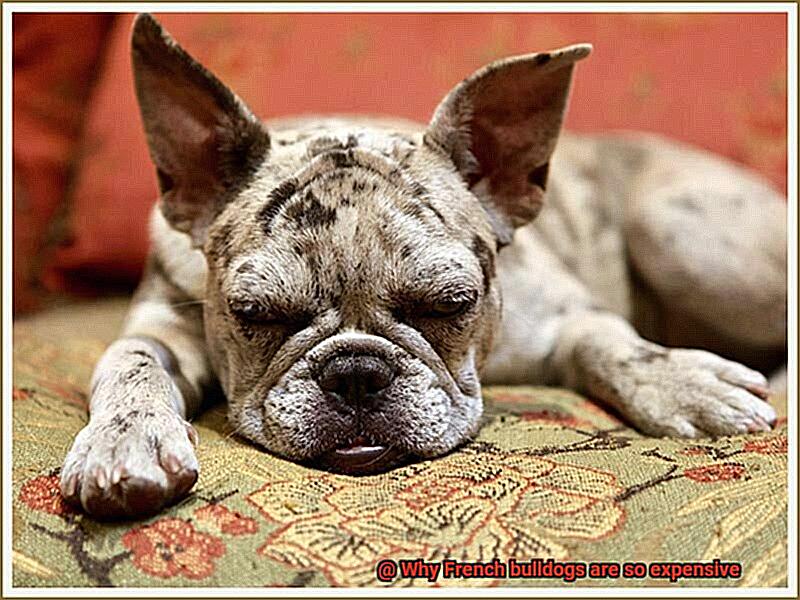Why French bulldogs are so expensive?
Welcome to our blog post, where we embark on a journey into the captivating realm of French bulldogs and uncover the enigma behind their extravagant price tags.
These pint-sized pooches have skyrocketed in popularity, becoming one of the most coveted canine breeds worldwide. But their desirability comes with a hefty price tag.
So, what exactly makes French bulldogs so expensive? Well, there’s a medley of factors at play – from their distinctive traits to the challenges faced in breeding them, all coupled with an ever-growing demand for these delightful companions.
By unraveling these intricacies, we can truly grasp why French bulldogs are worth every penny and discover what sets them apart from the rest.
High Demand for French Bulldogs
Contents
- 1 High Demand for French Bulldogs
- 2 Challenges of Breeding French Bulldogs
- 3 Health Issues in French Bulldogs
- 4 The Cost of Raising and Caring for a French Bulldog
- 5 Reputable Breeders Charge Higher Prices
- 6 Rarity of Certain Coat Colors or Markings
- 7 Importing French Bulldogs from Other Countries
- 8 Conclusion
In this blog post, we will delve into the reasons behind the high demand for French Bulldogs, exploring their popularity, breeding challenges, and the associated costs. So, if you’re a proud French Bulldog owner or considering adding one to your family, keep reading to discover why these furry friends have stolen our hearts.
Celebrity Influence:
French Bulldogs have gained popularity through celebrity endorsements, with numerous stars showcasing their adorable companions on social media platforms. From actors to influencers, these famous faces have undoubtedly contributed to the breed’s rising popularity.
Unique Appearance:

With their compact size, expressive eyes, and bat-like ears, French Bulldogs possess an irresistible charm that sets them apart from other breeds. Their distinctive features make them incredibly photogenic and sought after by dog lovers seeking a fashionable and trendy companion.
Limited Availability:
French Bulldogs may be in high demand, but their availability is limited. Reputable breeders often have long waiting lists, as the breeding process for French Bulldogs is complex and time-consuming. Due to their brachycephalic structure, artificial insemination and cesarean sections are commonly required for safe delivery, resulting in fewer puppies being available for sale.
Higher Breeding Costs:
The specialized care required during pregnancy, labor, and raising French Bulldog puppies increases the expenses associated with breeding. Responsible breeders invest in health testing and screening to ensure they are producing healthy offspring. These additional costs are reflected in the price of the puppies.
Unethical Breeding Practices:
The high demand for French Bulldogs has unfortunately attracted unscrupulous breeders looking to make quick profits. Puppy mills and backyard breeders often prioritize quantity over quality, resulting in health issues and lower-quality dogs. It is essential for potential buyers to do thorough research on reputable breeders who prioritize the health and well-being of their dogs.
Scams and Fraud:
The popularity of French Bulldogs has also led to an increase in scams and frauds. Some individuals or websites may advertise French Bulldog puppies at lower prices but fail to deliver the promised dog or provide false documents. Prospective buyers must exercise caution and verify the legitimacy of sellers before making a purchase.
Conclusion:
French Bulldogs have undeniably captured our hearts with their unique appearance, affectionate nature, and celebrity endorsements. However, it’s crucial to remember that the high demand for these adorable companions comes with challenges and potential risks. By understanding the reasons behind the high demand, being cautious of unethical breeders, and carefully considering the associated costs, prospective owners can make informed decisions and ensure they provide a loving home for their French Bulldog.
Challenges of Breeding French Bulldogs
Breeding French Bulldogs can be a challenging endeavor, and it’s important for potential breeders to understand the obstacles they may face.
In this section, we will explore some of the main challenges of breeding French Bulldogs and why they contribute to the high cost of these adorable dogs.
Unique Anatomy
French Bulldogs have a distinct head shape with a short muzzle and a compact body structure, known as brachycephalic traits. While these features are part of what makes them so charming, they also create difficulties during the breeding process. Natural mating can be challenging due to their unique anatomy, often requiring artificial insemination or surgical intervention.
Health Issues
French Bulldogs are prone to various health issues, primarily due to their brachycephalic features. Their narrow nostrils, elongated soft palates, and narrowed tracheas make it harder for them to breathe normally. This can cause severe breathing difficulties, especially in hot or humid climates. Breeding French Bulldogs requires careful selection of healthy parents with minimal respiratory issues to reduce the risk of passing on these health problems to their offspring.
In addition to respiratory problems, French Bulldogs are also susceptible to other genetic disorders such as hemivertebrae and luxating patellas. Responsible breeders conduct thorough health screenings and genetic testing of their breeding dogs to minimize the likelihood of passing on these conditions.
Small Litter Size
Compared to other dog breeds that may have larger litters, French Bulldogs typically have small litters of around 2-4 puppies. This limited number of puppies per litter increases the breeder’s expenses as they need to devote more time and resources to each individual puppy’s care. The small litter size also means that demand for French Bulldogs often exceeds supply, contributing to their high price tag.
Extensive Care during Pregnancy and Whelping
Due to the breed’s unique anatomy and small litter sizes, French Bulldogs often require specialized veterinary care throughout the entire breeding process. This includes regular prenatal check-ups, ultrasounds, and potential interventions such as caesarean sections during delivery to ensure the health and well-being of both the mother and puppies. These additional medical procedures and care contribute to the overall cost of breeding French Bulldogs.
Maintenance of High Standard of Care
Responsible breeders invest heavily in maintaining a high standard of care for their French Bulldogs. This includes providing proper nutrition, regular exercise, vaccinations, and routine veterinary check-ups for their breeding dogs.
These ongoing expenses contribute to the overall cost of breeding French Bulldogs, as breeders strive to produce healthy and well-socialized puppies.
Health Issues in French Bulldogs
If you’re thinking about bringing one of these adorable pups into your life, it’s important to be aware of the potential health issues they may face. These little cuties may have a few extra challenges to overcome due to their unique anatomy and genetic predispositions. But fear not. With a little knowledge and preparation, you can give your Frenchie the best chance at a happy, healthy life.
Brachycephalic Syndrome – Breathing Troubles
Let’s start with the elephant in the room (or should I say, the Frenchie in the room) – their flat faces. This charming feature can unfortunately lead to breathing difficulties known as brachycephalic syndrome. French Bulldogs have shortened airways, making it harder for them to breathe, especially in hot weather or during physical activity. Keep an eye out for signs of respiratory distress, like heavy panting or difficulty catching their breath. In severe cases, medical intervention may be necessary to ensure their well-being.
Spinal Problems – A Pain in the Back
French Bulldogs are prone to intervertebral disc disease, a condition that affects their spinal discs and can result in pain, weakness, and even paralysis. This is not a situation to take lightly. If your Frenchie starts showing signs of back pain or mobility issues, it’s crucial to seek veterinary attention promptly. Treatment options may range from conservative management to surgery, depending on the severity of the condition.
Itchy Skin and Allergies – Scratching Up a Storm
Is your Frenchie constantly scratching or losing hair? They might be dealing with skin allergies or dermatological issues. These little guys can develop allergies to certain foods, environmental factors (like pollen or dust mites), or even contact allergens such as certain fabrics or cleaning products. It’s essential to work with your veterinarian to identify and manage these allergies, which may involve specialized diets, medication, and avoiding triggers like a fashionista avoiding last season’s trends.
Eye Problems – Watch Those Peepers
Those big, expressive eyes are one of the French Bulldog’s most endearing features, but they can also be susceptible to certain issues. Cherry eye (a fancy term for the prolapse of the gland of the third eyelid) and corneal ulcers are common problems in Frenchies. Surgical intervention or ongoing medication may be necessary to maintain their ocular health and keep those peepers shining bright.
The Cost of Raising and Caring for a French Bulldog
French Bulldogs are undeniably charming and have become increasingly popular as pets. However, potential owners should be aware that these adorable pups come with a price tag. In this blog post, we will delve into the various costs associated with raising and caring for a French Bulldog. So, sit back, relax, and let’s get started.

The Initial Investment:
French Bulldogs are not cheap to acquire. The cost of purchasing a puppy from a reputable breeder can range from $1,500 to $5,000 or even more, depending on factors such as the pup’s pedigree and the breeder’s reputation. Remember, investing in a well-bred and healthy puppy is crucial to avoid future medical expenses.
Health Concerns:
French Bulldogs are notorious for their unique health concerns. Their brachycephalic (short-snouted) faces make them prone to breathing problems, which often require veterinary intervention. Regular check-ups, vaccinations, and preventive medications will be necessary to keep your Frenchie in tip-top shape.
Dietary Needs:
French Bulldogs have specific dietary requirements that may be more expensive than those of other breeds. They require high-quality dog food that is formulated to meet their nutritional needs. Additionally, some Frenchies may have food allergies or sensitivities, necessitating specialized diets that can further increase costs.
Grooming:

While French Bulldogs have short coats that don’t require extensive grooming, they do shed moderately and need regular brushing to maintain healthy skin and coat. Don’t forget about those adorable facial wrinkles that need regular cleaning to prevent infections. Some owners opt for professional grooming services, which can add up over time.
Training:
French Bulldogs are known for their stubbornness and independent streaks, making training a bit more challenging than with other breeds. Professional obedience classes or private training sessions may be necessary to ensure a well-behaved Frenchie, adding extra expenses to your budget.
Supplies:
Don’t forget about the ongoing expenses for supplies. French Bulldogs need toys, bedding, collars, leashes, and crates. These items may need to be replaced periodically as they wear out or become damaged. Additionally, mental stimulation is crucial for these intelligent pups, so investing in puzzle toys or interactive games is highly recommended.
Unexpected Medical Expenses:
French Bulldogs are prone to certain genetic conditions that may require costly medical interventions. Emergency vet visits, surgeries, and treatments for unforeseen health issues can quickly add up. It is essential to have a financial safety net in place to handle unexpected expenses.
Reputable Breeders Charge Higher Prices
When it comes to purchasing a French Bulldog, you may be tempted to go for a cheaper option from a less reputable breeder or even consider adopting from a rescue.
While these options may seem more budget-friendly, it’s important to understand why reputable breeders charge higher prices for their French Bulldogs. Here are some reasons to consider:
Quality Breeding Program
Reputable breeders have extensive knowledge and experience in breeding French Bulldogs. They invest significant time, effort, and resources into ensuring the health and well-being of their dogs. They carefully select breeding pairs based on health, temperament, and conformation, aiming to produce puppies that align with the breed standards.
Health Testing
Health testing is a crucial aspect of reputable breeding. Breeders conduct various health tests on their breeding dogs, including screenings for genetic diseases, hip and elbow dysplasia, and eye conditions. These tests help reduce the risk of passing on hereditary health issues to the offspring.
Proper Medical Care
Reputable breeders provide proper medical care for their dogs, including vaccinations, regular check-ups, and necessary treatments. They also ensure that the puppies receive appropriate veterinary care before they are sold.
Socialization
Responsible breeders dedicate substantial time and effort to socialize their puppies. They expose them to different environments, people, and situations to ensure they grow up well-adjusted and confident. This socialization helps develop good temperament and behavior in the puppies.
Showing and Recognition
Reputable breeders often take part in dog shows or other competitive events to showcase the quality of their breeding program. These events require entry fees, travel expenses, grooming costs, and other related expenses. The recognition they receive at these events adds to their reputation as reputable breeders.
Running Costs
The cost of running a reputable breeding program includes expenses such as high-quality dog food, proper housing facilities, regular grooming, training classes for both the breeder and the dogs, advertising, and professional memberships in breed clubs or organizations.
Lifetime Support
Reputable breeders offer lifetime support to the puppy buyers. They provide guidance and assistance throughout the dog’s life, answering any questions or concerns that may arise. This commitment requires ongoing communication and dedication from the breeder.
Limited Availability
The limited number of puppies produced by reputable breeders is another factor that contributes to their higher prices. Breeders prioritize the quality of their litters over quantity, ensuring each puppy receives individual attention and care.
Demand and Waiting Lists
Reputable breeders often have waiting lists for their puppies, indicating the demand for their well-bred French Bulldogs. The combination of their reputation, the quality of their breeding program, and the limited availability of their puppies drives up the price.
Rarity of Certain Coat Colors or Markings
French Bulldogs are already known for their adorable squishy faces and friendly personalities, but what really sets them apart are their coat colors and unique markings. These rare and sought-after traits make French Bulldogs even more desirable among dog enthusiasts. Let’s dive into why these coat colors and markings make French Bulldogs so special.
The Allure of the Blue Coat
One of the most popular and coveted coat colors in French Bulldogs is the blue or gray coat. This unique color is a result of a dilution gene that affects the production of pigment in their fur. The rarity of this color makes it highly sought after, as it adds a touch of exclusivity to these already adorable dogs.
The Charm of the Lilac Coat
If you want to take rarity to the next level, look no further than the lilac or isabella coat in French Bulldogs. This stunning light brown or chocolate-like color is a result of a combination of two dilution genes. These lilac Frenchies are incredibly rare, making them the holy grail for collectors and enthusiasts alike.
The Beauty of Markings
Coat colors aren’t the only thing that adds to a French Bulldog’s desirability; markings play a significant role too. The pied pattern, characterized by patches of white on a colored background, is highly sought after due to its unique and eye-catching appearance. Each pied French Bulldog has its own symmetrical pattern, making them true one-of-a-kind treasures.
Brindle, Fawn, and Merle Magic
Other markings like brindle and fawn also add to the charm of French Bulldogs. Brindle refers to a striped pattern on a base coat color, while fawn represents a light tan or beige color. These markings give each French Bulldog an individual look that stands out in a crowd.
And let’s not forget the mesmerizing merle pattern. This rare genetic mutation creates patches of diluted pigmentation on a solid base color, resulting in a truly unique and eye-catching appearance.
Merle Low
Remember, while these coat colors and markings may make French Bulldogs more desirable, they don’t affect the dog’s health or temperament. Responsible breeders prioritize the well-being of their dogs, regardless of their appearance. So, if you’re considering getting a French Bulldog, make sure to choose a breeder who puts the health and happiness of the dog first.
Importing French Bulldogs from Other Countries
If you’re a dog enthusiast and have your heart set on owning a French Bulldog with rare coat colors and markings, you may have considered importing one from another country. While this can be an exciting prospect, it’s important to understand the complexities and considerations involved in this process. As an expert in French Bulldogs and importing dogs, I’m here to provide you with the information you need to make an informed decision.
- Research import regulations and requirements: Each country has its own regulations and requirements for importing dogs. These may include health certificates, vaccinations, microchipping, and quarantine periods. It’s crucial to thoroughly research the import regulations of both the country of origin and the destination country to ensure a smooth process.
- Calculate the costs: Importing a French Bulldog can come with significant costs. Factors such as the distance between countries, transportation fees, import taxes, crate rental, and customs clearance should be taken into account. By calculating these costs upfront, you can determine if importing is financially feasible for you.
- Verify the reputation of breeders or sellers: Ethical breeding practices are essential when importing a French Bulldog. Before making any commitments, verify the credentials of the breeder or seller. Check for any health issues or genetic disorders in the lineage and ensure proper socialization and care for the puppies.
- Understand the risks and challenges: Importing a dog involves long-distance travel, which can be stressful for the animal. Delays or complications during transit are also possible. Additionally, cultural or language barriers may arise when dealing with breeders or sellers from different countries. Be prepared for these risks and challenges.
- Explore local options first: Before deciding to import a French Bulldog, explore local options. Reputable breeders or rescue organizations in your own country may have French Bulldogs available for adoption. This not only supports local breeders and reduces the carbon footprint associated with long-distance transportation but also allows you to physically meet and assess the dog before making a commitment.
XwmgGnceRd8″ >
Conclusion
In conclusion, the high price tag of French bulldogs can be attributed to a combination of factors.
Firstly, their unique physical characteristics and distinct breed standards make them highly sought after by dog enthusiasts. Secondly, the breeding process for French bulldogs is complex and requires careful selection to avoid health issues commonly associated with the breed.
Additionally, the limited availability of quality French bulldog puppies further drives up their cost. Lastly, the demand for these adorable companions far exceeds the supply, creating a market where prices are driven up by consumer demand.
But for those who can afford it, the joy and love they bring into your life are priceless.




